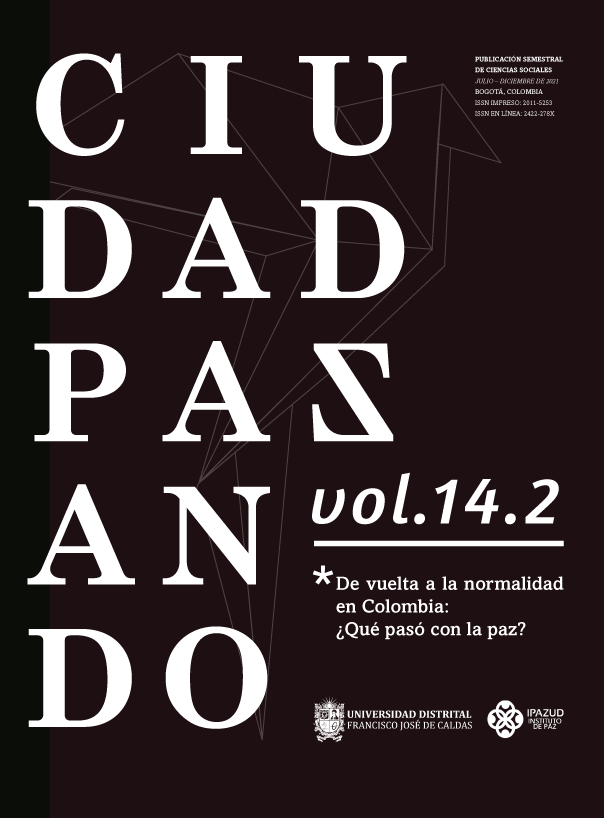DOI:
https://doi.org/10.14483/2422278X.17861Published:
2021-09-09Issue:
Vol. 14 No. 2 (2021): junio - diciembre. De vuelta a la normalidad en Colombia: ¿Qué pasó con la paz?Section:
Voces OtrasLa memoria y la historia: La fragilidad política del recuerdo
Memory and history: The political fragility of memory
Keywords:
Historicity, politics, memory, history, phenomenology, hermeneutics (en).Keywords:
Historicidad, política, memoria, historia, fenomenología, hermenéutica (es).Downloads
Abstract (es)
Este artículo pretende mostrar cómo en la relación de memoria e historia se configura una antropología política de la historicidad a través del análisis de la obra de Paul Ricoeur que permite explorar, de manera hermenéutica, las consecuencias de la relación del tiempo como historicidad y de la acción como política, de tal manera que, en los intersticios de la interpretación, sea posible sacar todas las derivaciones de la apertura del pasado, la afirmación de la iniciativa en el presente y de las esperanzas abiertas en el futuro lleno de posibilidades que la imaginación abre como ruptura de la fatalidad.
Abstract (en)
This article aims to show how a political anthropology of historicity is configured in the relationship between memory and history. Paul Ricoeur’s work allows us to explore, in a hermeneutic way, the consequences of the relationship between time as historicity and action as politics in order to, draw all the derivations of the past opening, the affirmation of the initiative in the present and the open hopes in the future full of possibilities that the imagination opens as a rupture of fatality.
References
Arendt, H. (1994). La condición Humana, Paidós.
Arendt, H. (1995). De la historia a la acción, Paidós.
Begué, M. F. (2002). Paul Ricoeur: la poética del sí mismo, Editorial Biblos.
Domingo, M. (2011). Fenomenología y política en Paul Rioceur, Investigaciones Fenomenológicas, (3).
García, J. (1985). De la hermenéutica semiológica a la semántica. El camino de Paul Ricoeur in Sobre hermenéutica. Estudios Filosóficos, (95).
Heidegger, M. (2006), Ser y Tiempo, Trotta.
MacIntyre, A. (1992). Tres versiones rivales de la ética, Rialp.
Ricoeur, P. (1949). Husserl et le sens de l'histoire. Revue de Métaphysique et de Morale, 54(3/4), 280-316.
Ricoeur, P. (1955). Histoire et verité (Historia y Verdad.). Le Seuil.
Ricoeur, P. (1985). Temps et récit. Tome III: Le temps raconté, Le Seuil.
Ricoeur, P. (1998). La marque du passé. Revue de metaphysique et de morale, (1), 7-32.
Ricoeur, P. (1999). La lectura del tiempo pasado. Arrecife.
Ricoeur, P. (2000). La mémoire, l'histoire, l'oubli. Seuil.
Ricoeur, P. (2002). Del Texto a la acción, Fondo de Cultura Económica.
Ricoeur, P. (2003). La mémoire source et fin de L'histoire en la Accademia Nazionale dei Lincei. [Conferencia]. Roma, Italia.
Ricoeur, P. (2004a). La memoria, la historia, el olvido (A. Neira, Trad.). Fondo de Cultura Económica.
Ricoeur, P. (2004b). Husserl y el sentido de la historia. Acta Fenomenológica Latinoamericana, (2).
Ricoeur, P. (2006). Mémoire, Histoire, Oubli. [Conferencia]. Esprit. https://doi.org/10.3917/espri.0603.0020
Ricoeur, P. (2009). Educación y política. Prometeo.
Ricoeur, P. (2010). La memoria, la historia, el olvido (2da ed.). Trotta.
Serrano, Enrique, (1999). Consenso y conflicto Schimitt, Arendt. Centro de Estudios de Política comparada.
How to Cite
APA
ACM
ACS
ABNT
Chicago
Harvard
IEEE
MLA
Turabian
Vancouver
Download Citation
License
Copyright (c) 2021 Ciudad Paz-Ando

This work is licensed under a Creative Commons Attribution-NonCommercial-ShareAlike 4.0 International License.
The Ciudad Paz-ando Journal (RCP) is an open access publication, without economic charges for authors or readers, whose biannual publications are made under the terms of the Creative Commons Attribution - Non-commercial - Share the same License (CC-BY-NC -SA 2.5 CO), with which others may distribute, remix, retouch, and create from the work in a non-commercial way, as long as they give credit and license their new creations under the same conditions.
The copyright holder is Ciudad Paz-ando journal, retaining all rights without restrictions, respecting the terms of the license regarding the consultation, download and distribution of the material.
When the work or any of its elements are in the public domain according to the applicable current law, this situation will not be affected by the license.
Likewise, we encourage authors to deposit their contributions in other institutional and thematic repositories, with the certainty that culture and knowledge is a good for all and for all.

